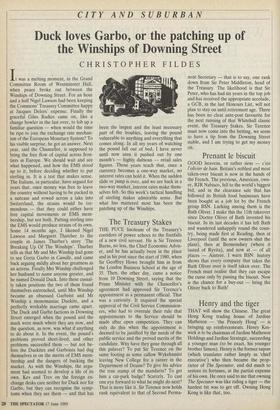The Treasury Stakes
THE PUCE linoleum of the Treasury's corridors of power echoes to the footfalls of a new civil servant. He is Sir Terence Burns, no less, the Chief Economic Advis- er, and he has actually been in the place and in his post since the start of 1980, when Sir Geoffrey Howe brought him in from the London Business School at the age of 35. Then, the other day, came a notice from 10 Downing Street, saying that the Prime Minister with the Chancellor's agreement had approved Sir Terence's appointment as a permanent official. That was a curiosity. It required the special approval of the Civil Service Commission- ers, who had to overrule their rule that appointments to the Service should be made after open competition. They can only do this when the appointment is deemed to be justified by the needs of the public service and the proved merits of the candidate. Why have they gone through all this palaver? To put Sir Terence on the same footing as some callow Wykehamist leaving New College for a career in the Department of Drains? To give his advice the true stamp of the mandarin? To get him a car-park badge? Scarcely. To cast one eye forward to what he might do next? That is more like it. Sir Terence now holds rank equivalent to that of Second Perma- nent Secretary — that is to say, one rank down from Sir Peter Middleton, head of the Treasury. The likelihood is that Sir Peter, who has had six years in the top job and has received the appropriate accolade, a GCB, in the last Honours List, will not plan to stay on until retirement age. There has been no clear ante-post favourite for the next running of that Whitehall classic event, the Treasury Stakes. Sir Terence must now come into the betting, we seem to have a tip from the Downing Street stable, and I am trying to get my money on.


















































 Previous page
Previous page